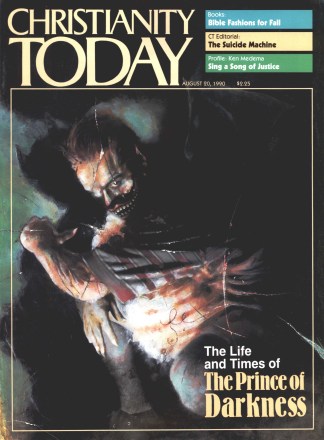Missiologist Donald McGavran, widely regarded as the father of the contemporary church-growth movement, died of cancer on July 10 at the age of 92 at his home in Altadena, California.
Like his grandparents and parents before him, McGavran was a missionary to India under the auspices of the Disciples of Christ.
McGavran was a virtual outsider to the evangelical world until he became a senior citizen. Though he had barely heard of Fuller Theological Seminary, McGavran, at age 67, accepted the seminary’s offer to launch its School of World Mission. With this school as his platform, McGavran’s missiological views began to take root, particularly among scholars.
Said Ralph Winter, head of the U.S. Center for World Mission, “There is no man who has tramped more places and investigated more mission-field situations than Donald McGavran, and there probably never will be another.” Winter credited McGavran with single-handedly launching the now popular “unreached peoples” missiological movement and with virtually creating the scholarly field of evangelical missiology.
McGavran’s views were characterized by a strident pragmatism. He spoke in terms of research and evangelistic strategies. McGavran insisted that evangelistic efforts be assessed in terms of their success in winning people to Christ. Critics felt such an approach risked short-circuiting the work of the Holy Spirit. But McGavran justified his views by appealing to the theology of stewardship. And no one questioned McGavran’s motives, or the intensity of his love for the lost.
James Engel, distinguished professor of marketing, research, and strategy in the graduate program at Eastern College, called McGavran a “pioneer in demanding that we evaluate churches on some objective bases.” Said Engel, “He forced us to differentiate between what is ineffective in the Lord’s work and what is effective,” adding, “This laid the groundwork for a whole new era of assessment evaluation that went way beyond church growth.”
CAPITAL CURRENTS
Arts clash continues
The arts-funding controversy (CT, June 18, 1990, p. 52) will soon move from the House of Representatives to the Senate, and several religious groups are already preparing for the battle. The Southern Baptist Convention’s Christian Life Commission (CLC) has sent a letter to all U.S. senators expressing their “deep concerns” about the National Endowment for the Arts (NEA). “Unless Congress enacts meaningful standards … which will prohibit the funding of ‘obscene, highly offensive, morally repugnant, and sacrilegious art,’ we will have no choice but to call for the abolition of the National Endowment for the Arts,” wrote CLC executive director Richard Land.
Beverly LaHaye of Concerned Women for America has urged her supporters to petition President Bush to veto any congressional measure that does not include content restrictions for the NEA.
Political potpourri
A broad coalition of religious groups has drafted a bill designed to overturn this term’s Supreme Court decision allowing states to prohibit the use of peyote in religious ceremonies. Groups including evangelicals, mainline Protestants, Catholics, and Jews viewed the decision as a severe intrusion into the free exercise of religion.
The House of Representatives has voted to refuse American funds for the International Planned Parenthood Federation and the United Nations Population Fund because of their promotion of abortion. Last fall, both houses of Congress approved the funds, forcing a veto by President Bush.
Democratic insiders say one reason the Democrats chose New York City over New Orleans as their 1992 convention site was the Louisiana legislature’s recent passage of a restrictive abortion law.










